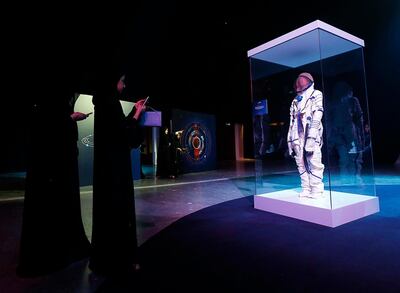The UAE's historic Mars mission remains on track - with the satellite probe to the Red Planet set to arrive in time for the country's milestone 50th anniversary.
The Hope Probe is to be launched from Japan, between July and September of next year, and will orbit around Mars in 2021 as scheduled, said the lead engineer for the ambitious project.
The huge boost for the country's growing space programme came as it was revealed that the bid to send the first Emirati into space will be delayed.
Omar Hussain, Lead Mission Design and Navigation Engineer for the Emirates Mars Mission, speaking at the Science Event 2019 held at Mohammed Bin Rashid Space Centre in Dubai, said the team have had to overcome a number of challenges along the way.
“It is too early to talk about a specific date just yet but everything is on track and there have been no delays,” said the 29-year-old Emirati.
“Speaking for myself, it has been challenging because I had to switch from planning for Earth-based projects to interplanetary missions.
“It took a lot of education to get to that point as I had never done a mission that goes beyond the Earth’s lower orbits. I had to study how I would get the spacecraft from Earth to Mars.”
While the Hope Probe would not be the first satellite to transmit data of Mars’ environment, it would offer something unique, according to Mr Hussain.
“We are going to study the atmosphere of Mars throughout all of the Martian seasons,” he said.
“This is the first mission of its kind, there have been missions that studied the atmosphere of Mars – but they were in different orbits.
“Our orbit allows us to study how the seasons on Mars are affected by the light of the sun.”
He said the data that the Hope Probe sends back would make the UAE a major player in the 21st century space race.
________________
Read more:
UAE astronauts challenged to survive for days alone in Russian winter wilderness
Countdown to history: The inside story of how the UAE landed its first place in space
UAE astronaut candidates begin intensive physical testing in Russia
We have lift-off: UAE's Khalifa Sat to be launched into space
________________
“We will become a serious player in the deep space race. The findings of the Hope Probe will help us contribute to the scientific community in a major way,” he said.
“The data that the UAE produces will help to come up with new scientific discoveries that will benefit the entire world.”
The conference also heard that the first Emirati astronaut will soar into space "later than hoped".
Either Hazza Al Mansouri, 34, and Sultan Al Neyadi, 37, were due to fly to the International Space Station in April, on board the Soyuz rocket.
However, the project suffered a setback when the Soyuz MS-10 failed to launch in October, which affected the timetable for future flights.

The National reported in October how a joint inquiry by Nasa and the Russian space agency Roscosmos was likely to cause delays for the project to send the first Emirati into space.
“We will be having a press conference in the coming months announcing the new date,” said Salem Humaid Al Marri, assistant director general for science and technology at the Mohammed Bin Rashid Space Centre.
“The flight will take place later than we would have hoped because of the incident that occurred.”
Visitors to the Science Event were also treated to new footage of the Emirati astronauts undergoing micro gravity training at the Yuri Gagarin Cosmonaut Training Centre, north-east of Moscow, Russia.
The video showed Mr Al Mansouri and Mr Al Neyadi undergoing training, in micro gravity conditions, wearing heavy suits that have to be removed within 15 seconds, in the case of an emergency.
The training included how to cope with the dizziness and sickness caused by spinning around when returning to the Earth.


